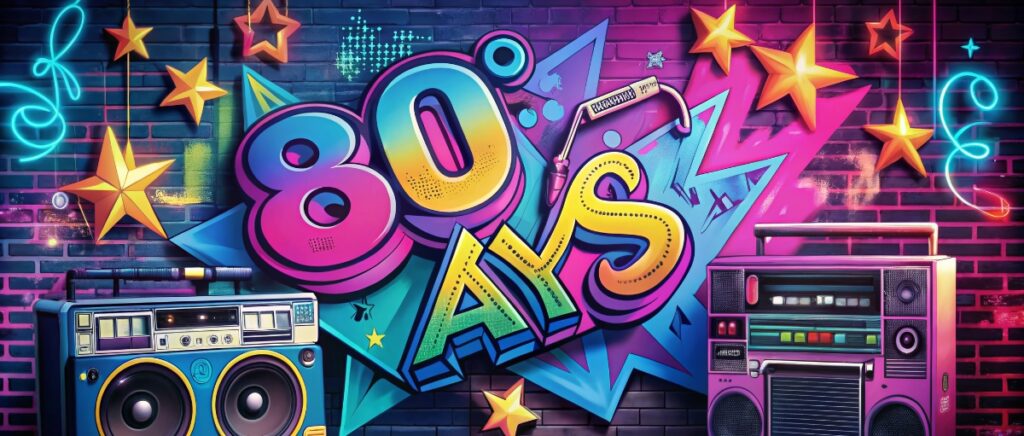Do you ever find yourself saying “like, totally” or “gag me with a spoon” without a second thought? If so, you’re not alone. Many Americans still use slang terms from the 1980s in their everyday conversations. But have you ever stopped to think about the origins and cultural significance of these radical phrases?
The 1980s were a decade of bold fashion, groundbreaking music, and, of course, totally bodacious slang. From Valley Girls to surfer dudes, the language of the 80s was as diverse and colorful as the people who used it. But 80s slang was more than just a passing fad—it became a defining feature of an entire generation’s identity.
In this gnarly journey through the tubular world of 80s slang, we’ll explore the origins and meanings behind some of the decade’s most iconic phrases. We’ll also delve into the cultural context that gave rise to this unique language, from the influence of popular media to the impact of various subcultures.
So grab your Walkman, throw on your favorite neon windbreaker, and get ready to take a wild ride through the fascinating and enduring world of 80s slang.
Setting the Stage: The Cultural Context of Slang from the 80s
To fully appreciate the impact and significance of 80s slang, it’s essential to understand the cultural landscape that shaped it. The 1980s were a decade of rapid change and transformation, marked by major historical events, technological advancements, and shifting social norms.
The Rise of Youth Culture
One of the defining features of the 1980s was the emergence of a powerful youth culture that challenged traditional values and embraced new forms of expression. This was the decade of MTV, which launched in 1981 and revolutionized the music industry with its 24-hour programming of music videos. Suddenly, artists like Madonna, Michael Jackson, and Duran Duran became household names, their fashion and style emulated by millions of young fans worldwide.
But music wasn’t the only area where youth culture made its mark. The 1980s also saw a boom in teen-oriented movies and TV shows, from the iconic John Hughes films like “The Breakfast Club” and “Ferris Bueller’s Day Off” to the quirky sitcom “Saved by the Bell.”
Technological Shifts
The 1980s also witnessed significant technological advancements that would reshape communication and social interaction for future generations. The personal computer became more accessible and affordable, with models like the Apple Macintosh and the Commodore 64 finding their way into homes nationwide.
At the same time, the first mobile phones began to appear, though they were still bulky, expensive, and far from ubiquitous. Nevertheless, these early devices hinted at the transformative potential of mobile communication, a trend that would explode in the decades to come.
A Decade of Contrasts
For all its vibrancy and optimism, the 1980s were also a decade of stark contrasts and challenges. The AIDS crisis cast a long shadow over the decade, claiming thousands of lives and sparking widespread fear and discrimination. The Cold War continued to simmer, with tensions between the United States and the Soviet Union reaching new heights.
Yet despite these sobering realities, the 1980s remained a time of great creativity, experimentation, and self-expression. Against this complex and contradictory backdrop, the unique language of 80s slang emerged, reflecting the hopes, dreams, and anxieties of a generation coming of age in a rapidly changing world.
The Origins and Influences of 80s Sayings
The slang of the 1980s didn’t emerge in a vacuum; rather, it was the product of a complex interplay of cultural forces, from the rise of specific subcultures to the influence of popular media. To truly understand the language of the decade, it’s essential to explore these diverse origins and influences.
Valley Girls and Valspeak
Valley Girls, a subculture of young, affluent women from the San Fernando Valley in Southern California, made enduring contributions to 80s slang. Known for their unique fashion sense and way of speaking, called Valspeak, they popularized terms like “like,” “totally,” and “awesome,” and phrases like “gag me with a spoon” and “barf me out.”
Surfer and Skater Slang
In the 80s, surfing and skateboarding lingo, like “gnarly,” “radical,” and “tubular,” became popular thanks to movies like “Fast Times at Ridgemont High” and “Bill & Ted’s Excellent Adventure.”
Hip-Hop and AAVE
The 1980s also saw the rise of hip-hop culture, bringing a whole new vocabulary rooted in African American Vernacular English (AAVE). Terms like “dope,” “fresh,” and “def” became part of the larger lexicon of 80s slang, thanks to the growing popularity of hip-hop music and the influence of artists like Run-DMC, LL Cool J, and the Beastie Boys.
The Role of Popular Media
80s sayings were also heavily influenced by popular media, with movies like “The Breakfast Club” and “Ferris Bueller’s Day Off,” TV shows like “Miami Vice” and “The Simpsons,” and the rise of MTV and music videos all playing a major role in spreading slang terms and styles.
The Most Epic 80s Slang Terms
From “radical” to “gnarly,” the 1980s gave us some of recent most memorable and enduring slang terms. Here’s a closer look at some of the most iconic examples:
Rad and Gnarly
Two of the most quintessential 80s slang terms, “rad” and “gnarly” were often used interchangeably to describe something considered excellent, impressive, or exciting. These terms originated in the surfing and skateboarding communities but quickly spread to the mainstream.
Awesome and Wicked
Another pair of slang terms that dominated the 80s were “awesome” and “wicked.” While “awesome” was used to describe anything considered extremely good or impressive, “wicked” was often used in a similar context, particularly in the northeastern United States.
Bogus and Airhead
On the flip side, the 80s also had plenty of slang terms for things that were considered uncool or unimpressive. “Bogus,” for example, was used to describe something fake, insincere, or just plain bad, while “airhead” was a term for someone considered silly, superficial, or unintelligent.
Chill Pill and Spaz
The 80s were a decade of high energy and big emotions, and plenty of slang terms were used to describe those who couldn’t quite keep up. If someone was acting too stressed out or high-strung, they might be told to “take a chill pill,” while someone who was acting overly excited or erratic might be called a “spaz.”
Veg Out and Couch Potato
Of course, not everyone in the 80s was looking for a thrill. Some preferred to “veg out,” or relax and do nothing, often while parked in front of the television. These folks might be called “couch potatoes,” a term that has since become a common part of the American lexicon.
The Evolution and Legacy of Slang From the 80s
While many slang terms from the 1980s have fallen out of use, others have proven remarkably resilient, remaining a beloved part of our cultural vocabulary today. Terms like “awesome,” “cool,” and “chill” have become so commonplace that it’s easy to forget their origins in the 80s.
However, the influence of 80s slang extends beyond just individual words and phrases. The playful, irreverent spirit of 80s language has continued to shape the way we communicate, particularly in the realm of popular culture. From the “not!” joke popularized by Wayne’s World to the ironic use of “like” and “totally” in contemporary speech, the linguistic legacy of the 80s is still very much alive.
At the same time, 80s slang has taken on a nostalgic quality, particularly for those who came of age during the decade. For many baby boomers, hearing terms like “gag me with a spoon” or “psych!” can transport them back to a time of big hair, bright colors, and carefree attitudes.
In fact, the enduring appeal of 80s slang may be partly due to its ability to evoke such strong memories and emotions. In a world that can often feel complex and uncertain, the simple, playful language of the 80s offers a comforting sense of familiarity and fun.
Why 80s Sayings Still Matters
So why does 1980s slang still matter nearly four decades later? For one thing, it is a powerful reminder of how language and culture constantly evolve, shaped by each generation’s unique experiences and perspectives.
Perhaps more importantly, 80s slang speaks to the enduring power of youth culture and the importance of self-expression. In a decade of rapid change and cultural upheaval, young people used language to assert their identity, challenge the status quo, and connect.
For baby boomers who came of age during this time, 80s slang represents a valuable link to their past, a way to connect with cherished memories and experiences. For younger generations, learning about the slang of the 80s can provide valuable insights into the cultural and linguistic heritage that has shaped the world we live in today.
Ultimately, the story of 80s slang is a testament to the resilience and adaptability of language itself. As new generations come of age and new cultural forces emerge, the slang of the past may fade away. Still, the spirit of creativity, playfulness, and self-expression that underlies it will always endure.
Keeping the Rad Alive
From the bold, brash attitudes of Valley Girls to the laid-back cool of surfers and skaters, the slang of the 1980s reflected a generation that was unafraid to express itself and challenge the status quo. While some of the specific terms and phrases may have fallen out of use, the spirit of creativity and self-expression that underlies them is as relevant today as ever.
For baby boomers, embracing 80s slang can be a way to stay connected to the experiences and memories that have shaped their lives. Whether it’s using a favorite phrase from back in the day or sharing stories about the cultural touchstones of the decade, engaging with the language of the 80s can be a powerful way to keep the past alive and relevant.
For younger generations, learning about the slang of the 1980s can provide a valuable window into a cultural moment that continues to shape our world in countless ways.
So whether you’re a baby boomer looking to reconnect with your past or a millennial curious about the cultural forces that have shaped your world, exploring and appreciating the slang of the 80s is a totally tubular idea. Because in the end, keeping the rad alive isn’t just about nostalgia—it’s about recognizing the enduring power and importance of language, culture, and self-expression, and celebrating how they continue to shape our lives and our world.
Sources
Disability Services of America. (n.d.). Ticket to Work: Disability specialists debunk common myths. Retrieved from https://www.disabilityservicesofamerica.com/library/ticket-to-work-disability-specialists-debunk-common-myths.cfmBritannica on MTV: The Editors of Encyclopaedia Britannica. (2023, September 12). MTV. Encyclopaedia Britannica. https://www.britannica.com/money/MTV
CWSI Security on the History of the Apple Macintosh: CWSI Security. (n.d.). The history of the Apple Macintosh. CWSI Security. https://cwsisecurity.com/the-history-of-the-apple-macintosh/
University of Hawaii on AAVE: University of Hawaii. (n.d.). African American Vernacular English (AAVE). Language Varieties Web Site. https://www.hawaii.edu/satocenter/langnet/definitions/aave.html











